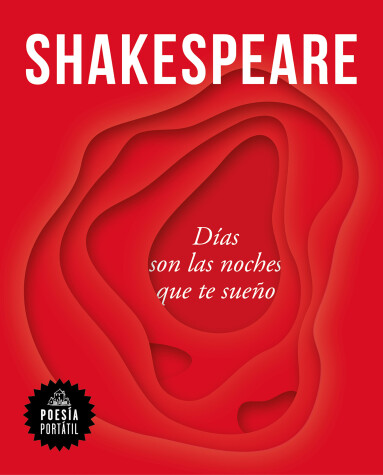Poesia Portatil / Flash Poetry
1 total work
Shakespeare. Días son las noches que te sueño / Nights Become Days When I Dream of You
by William Shakespeare
Published 19 November 2019
William Shakespeare se une a «Poesía Portátil» con una selección de sus sonetos, tan eternos como sus obras de teatro.
El mayor dramaturgo de todos los tiempos fue también un extraordinario poeta, y como tal ya habría pasado a la posteridad. La fluidez que mostró enlazando versos sobre el escenario encuentra su vertiente más íntima en la lírica. Las cuestiones inherentes a la condición humana son perfiladas por un Shakespeare que, sin ocultarse detrás de personajes ficcionales, descubre sus más profundas inquietudes sobre el amor, la muerte, la pervivencia y el inexorable paso del tiempo. Con la magnífica traducción de Andrés Ehrenhaus, los textos aquí seleccionados respetan el verso original y suponen un festín para los amantes de las buenas letras.
«Mis ojos ven mejor si están cerrados,
así no se distraen con simplezas;
mas al dormir, te ven en sueños claros
y brillan en lo oscuro como estelas.
Y tú, sombra que alumbras a otras sombras,
si a ojos que no ven reluces tanto,
¿podrá lucir aún más tu dulce formaen plena claridad y a pleno campo?
Pues si en la noche inerte tus borrosos
contornos engalanan mi pupila,
¿podrán embelesarse más mis ojosal verte a la luz viva de los días?
El día es noche cuando no te veoy días son las noches que te sueño.»
ENGLISH DESCRIPTION
William Shakespeare joins the "Portable Poetry" collection with a selection of sonnets as timeless as his plays.
The greatest playwright of all time was also an extraordinary poet, and as such he would have gone down in history. The fluency he showed linking verses on stage has its most intimate origins in the lyric. Themes inherent in the human condition are outlined by a Shakespeare who, without hiding behind fictional characters, brought forth his deepest concerns about love, death, survival, and the inevitable passage of time. The texts selected here are true to the original verses and with Andres Ehrenhaus’ magnificent translation, they are a feast for all book lovers.
Sonnet 43
“When most I wink, then do mine eyes best see,
For all the day they view things unrespected;
But when I sleep, in dreams they look on thee,
And darkly bright, are bright in dark directed.
Then thou, whose shadow shadows doth make bright,
How would thy shadow's form form happy show
To the clear day with thy much clearer light,
When to unseeing eyes thy shade shines so!
How would, I say, mine eyes be blessed made
By looking on thee in the living day,
When in dead night thy fair imperfect shade
Through heavy sleep on sightless eyes doth stay!
All days are nights to see till I see thee,
And nights bright days when dreams do show thee me.”
El mayor dramaturgo de todos los tiempos fue también un extraordinario poeta, y como tal ya habría pasado a la posteridad. La fluidez que mostró enlazando versos sobre el escenario encuentra su vertiente más íntima en la lírica. Las cuestiones inherentes a la condición humana son perfiladas por un Shakespeare que, sin ocultarse detrás de personajes ficcionales, descubre sus más profundas inquietudes sobre el amor, la muerte, la pervivencia y el inexorable paso del tiempo. Con la magnífica traducción de Andrés Ehrenhaus, los textos aquí seleccionados respetan el verso original y suponen un festín para los amantes de las buenas letras.
«Mis ojos ven mejor si están cerrados,
así no se distraen con simplezas;
mas al dormir, te ven en sueños claros
y brillan en lo oscuro como estelas.
Y tú, sombra que alumbras a otras sombras,
si a ojos que no ven reluces tanto,
¿podrá lucir aún más tu dulce formaen plena claridad y a pleno campo?
Pues si en la noche inerte tus borrosos
contornos engalanan mi pupila,
¿podrán embelesarse más mis ojosal verte a la luz viva de los días?
El día es noche cuando no te veoy días son las noches que te sueño.»
ENGLISH DESCRIPTION
William Shakespeare joins the "Portable Poetry" collection with a selection of sonnets as timeless as his plays.
The greatest playwright of all time was also an extraordinary poet, and as such he would have gone down in history. The fluency he showed linking verses on stage has its most intimate origins in the lyric. Themes inherent in the human condition are outlined by a Shakespeare who, without hiding behind fictional characters, brought forth his deepest concerns about love, death, survival, and the inevitable passage of time. The texts selected here are true to the original verses and with Andres Ehrenhaus’ magnificent translation, they are a feast for all book lovers.
Sonnet 43
“When most I wink, then do mine eyes best see,
For all the day they view things unrespected;
But when I sleep, in dreams they look on thee,
And darkly bright, are bright in dark directed.
Then thou, whose shadow shadows doth make bright,
How would thy shadow's form form happy show
To the clear day with thy much clearer light,
When to unseeing eyes thy shade shines so!
How would, I say, mine eyes be blessed made
By looking on thee in the living day,
When in dead night thy fair imperfect shade
Through heavy sleep on sightless eyes doth stay!
All days are nights to see till I see thee,
And nights bright days when dreams do show thee me.”
